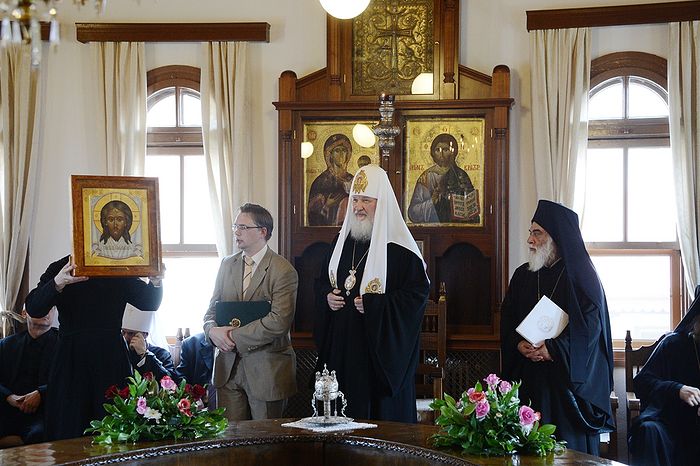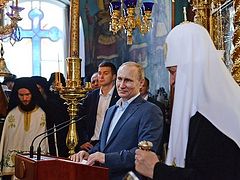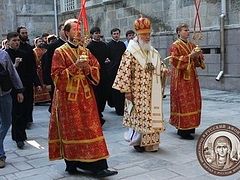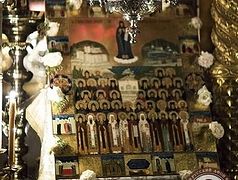On May 27, 2016, His Holiness Patriarch Kirill of Moscow and All Russia celebrated a moleben of thanksgiving at the Russian Monastery of St. Panteleimon on Mt. Athos. Below is the text of his primatial homily.
Your Eminence Metropolitan Apostolos of Miletus, Your Eminences and Your Graces, Very Rev. Father Jeremiah, dear Fathers and Brethren, Christ is Risen!
Every time I set foot on the ground of Athos I have the special feeling that this is a land in which ascetic work has been carried out for many centuries by people who left the world to come here, to a lonely place, and devoted their life to prayer, contemplation and labor. Prayer is the core of monastic life. As one saint put it, a monk without prayer is a smoldering piece of wood, worthless because it can neither burn nor be used for anything. The same applies to the monastic life: if a monk no longer has sincere prayer of the heart, nothing is left in his life, for prayer is its core. It is because all monks of Mt. Athos have zealous prayer, combining it with fasting and solitude, that those who come here feel that this place is a spring of Divine grace.
I have come here with my companions to celebrate together with you, my dear brethren, the millennium of the Russian presence on the Holy Mountain. Most researches unambiguously state that Russians first came to Athos immediately after the Baptism of our people or perhaps even before that. However, since we have no other historical evidence, we reckon the millennium of the Russian presence on Mt. Athos from 1016, since a document of that time has the signature of the igumen of the “monastery of the Russians.”
Much has happened in the history of Athos, as well as in the history of our land for these thousand years. Yet, the ties established a very long time ago have never really broken, even in the hardest times of godlessness and tribulations. Albeit physical communication was impossible, here, on Mt. Athos, especially at the Russian Monastery of St. Panteleimon, there were those who always prayed to God for our people and our Church. When the first opportunity to visit the Holy Mountain opened up, our bishops, priests and lay pilgrims started coming here, only several people a year at first, then the number started growing.
I remember well my first visit, my first pilgrimage to Athos in 1971, when I accompanied His Holiness Patriarch Pimen. Seven monks were here at the time. When we went to the church of the Protecting Veil of the Most Holy Theotokos to celebrate the All-Night Vigil, there was no electricity, it was dark and we had a feeling that no one was around, there were just quiet empty corridors. It was only when I reached the entrance to the church and saw icon-lamps burning and several hunch-backed Russian monks that I realized that our people were here and our Church was present here, and that the number of people was not the main thing. My heart was filled with joy, for in this little flock I saw the glorious future of our abode.
As we see today, times have changed and numerous pilgrims representing all countries and all peoples living under the omophorion of the Russian Orthodox Church visit the Holy Mountain. We wanted to organize special celebrations to mark the millennium of Russian monasticism on Athos and, of course, to restore what was destroyed, be it by fire, time or desolation. That is why I have a special feeling as I now see the old Monastery of St. Panteleimon completely renovated. It has been made possible, because nothing stands in the way of maintaining spiritual ties between Russia and Athos. We know with what selfless love many Orthodox Christians responded to the appeal made by the Patriarch, contributing to the restoration of the Monastery of St. Panteleimon on the occasion of this millennium jubilee. Among those who responded to the call were the Russian government and many faithful children of our Church who helped make this old dream come true.
I thank all those who have made their contribution. I am grateful to Russia’s state authorities, to the President who, I hope, will pray with us tomorrow, to the Prime Minister who is the head of the foundation for the restoration of the monastery, contributing to the implementation of the proposed projects, as well as to all the benefactors, whose names are known to God.
I am glad that this love finds response here, on Mount Athos, first of all, in your prayers, dear brethren. I ask all of you to continue to pray for the Russian land, for our Church and people who, in spite of the hardest historical ordeals, have preserved faith and remained faithful to Christ.
I am happy to see Father Jeremiah, our elder, abbot and Archimandrite of this holy abode. I recall Father Jeremiah not exactly as a young man, but as a very energetic monk who would work zealously, fulfilling his obediences. I was always deeply moved to see Father Jeremiah returning back from Thessaloniki with food stuffs and the necessities for the monastery. I remember once Father Jeremiah broke his arm, but he continued to fulfill his obediences nevertheless.
This remarkable example is to help young monks realize the importance of obedience in monastic life, no matter what is our position in the Church or in the monastery. Obedience is of utmost importance for every monk, and he should think about it with humility and meekness.
I would like to once again greet all of you, Father Jeremiah, the brethren, the pilgrims, the guests and all those who today begin to celebrate with us this momentous event in the life of the Russian Church and Mount Athos. May God’s blessing be with you all. God save you!




